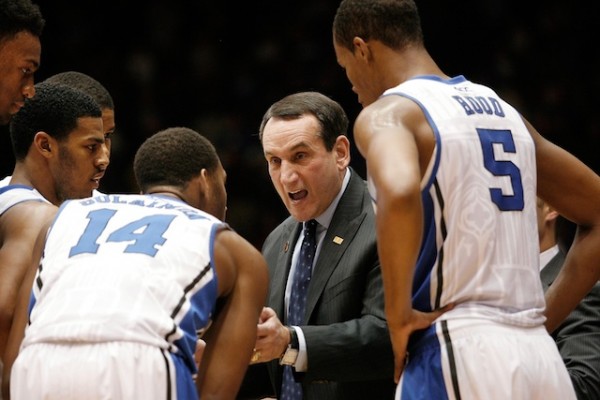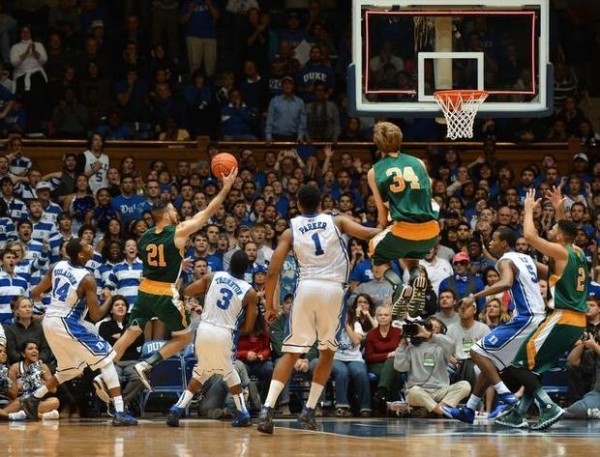Heading to New York, Duke Looking for Answers on Defense
Posted by Brad Jenkins (@bradjenk) on November 27th, 2013Duke’s 91-90 victory over Vermont Sunday night may be the most disappointing win Mike Krzyzewski has ever had during his long tenure patrolling the sidelines in Cameron Indoor Stadium. It wasn’t so much that the underdog Catamounts almost pulled off the biggest upset in over 30 years in Cameron, but it was how easily the Blue Devils made it for them to do so. To say Duke’s defense was bad is an understatement. It was historically bad.
Going back to 2003, when Ken Pomeroy began tracking advanced statistics, only twice before has a visiting team come in to Durham and posted an offensive efficiency of over 1.25 points per possession. The 2009 eventual national champion North Carolina squad posted a 1.28 PPP in a 101-87 UNC win. Then in 2012, the Tar Heels did it again, beating Duke 88-70 while scoring 1.26 points per trip. While Vermont is never going to be confused with either of those North Carolina teams that were #1 seeds in the NCAA Tournament, the Catamounts blew those numbers away. Unbelievably, Vermont shredded Duke for 90 points in a 65-possession game. That works out to an astounding 1.39 points per possession. Not only is that the highest allowed in Cameron in the last 12 years, it’s the highest number against Duke anywhere during that time.In his postgame press conference, Krzyzewski said, “We were awful. This was an unacceptable performance. We were lucky to win.” The main issues, according to the coach, were a lack of communication on defense, along with an attitude problem that he summed up with the comment, “We didn’t talk [on defense] because we didn’t think we needed to.” A clearly dispirited Krzyzewski went on to chastise his team for being disrespectful, not only of Vermont, whose performance he described as “beautiful,” but more importantly for being disrespectful to the game. An alarming aspect of the proceedings was the reaction of the Duke players as Vermont scored almost at will. Sure, there was the occasional shrug and some looks of concern on their faces, but no individual Blue Devil seemed to be upset enough to change his behavior. Coach K has to be disappointed in the lack of on-court leadership he’s currently getting.
The technical flaws in the defense feature some that we expected, but others we did not. Without a rim protector in the Duke lineup, opponents were expected to have some success in driving to the basket. That was certainly the case on Sunday. According to Vermont head coach John Becker, his team came into the game only converting 55 percent of their shots at the rim. Against Duke, they made 76 percent of their total two-point attempts, including jumpers as well as layups and dunks. After Sunday’s game, the Blue Devils now rank #224 in the country in two-point field goal percentage defense (50.9%). Duke was also expected to struggle with defensive rebounding this season, and that has hurt them at times, but recent Duke teams have been similar in that regard and usually made up for it in other ways. That was supposed to be the case this year, with a quicker team using pressure defense to force turnovers like the great Duke defenses of the past. However, right now the Devils rank even worse at #257 in opponents’ turnover percentage (16.5%). While carving Duke up off the bounce, Vermont recorded 21 assists compared to only six turnovers.
So the real question is: What can be done to improve Duke’s defense? The problems look deeper than one or two bad performances. Some are wondering if the successful Duke system of the past — pressure perimeter defense with rotating weak side help – can still work with the new rules put in to help college basketball offenses. These rules allow almost no contact on the dribbler and have basically eliminated charges in the lane. For years, Duke’s opponents have complained about excessive hand and body contact from on-ball defenders, and of course Duke is well known for its propensity at drawing charges. At least so far this season, Duke has not shown it has adjusted well to this new style of officiating. But don’t look for Coach K to switch to a zone defense anytime soon. He made it clear after the Vermont game that it’s not the type of defense that is the problem, but rather the collective effort and execution of the players.
The next three games for Duke will now have added importance. This week the Blue Devils head to New York’s Madison Square Garden for the NIT Season Tip-Off. In today’s semifinals the Blue Devils will face a good Alabama team, with a likely championship showdown against #4 Arizona scheduled for Friday. Then it’s back to Durham for an ACC/Big Ten Challenge meeting with Michigan next Tuesday. After that stretch of games, we should know if Duke’s defense has the potential for sustainable improvement; if it doesn’t, not even the #1 rated offense in the country will be enough to keep Duke a national title contender this season.













































I think the one component that was missed, and the one that is most likely for Duke to fix, is the complete lack of help rotations being made. This is most likely what Coach K meant when he talked about “lack of communication.” Not having a true rim protector is one thing, but Parker is still a talented shot blocker and Hood can hold his own inside as well, especially against penetrating guards. The problem was that on too many occasions, Vermont found themselves completely alone at the rim, or with only Quinn Cook in their way. One of the keys to Dukes pressure defense is precise rotations. It should take more than one or two passes to get to a wide open shot at the rim, but the young guys in the front court (Parker, Hood, and Jefferson) have often found themselves caught out on a big guy on the wing when they should have helped in the post. Part of this is their own youth and not recognizing the play yet. The other is likely the guards not asking for help quick enough. Duke is also switching on virtually every screen with this defense, and it has often left Quinn Cook stuck on a big man with no chance to stop him. This is the part of the game where the young guys need to mature quickly or Duke will find themselves with an unfamiliar seed come march.